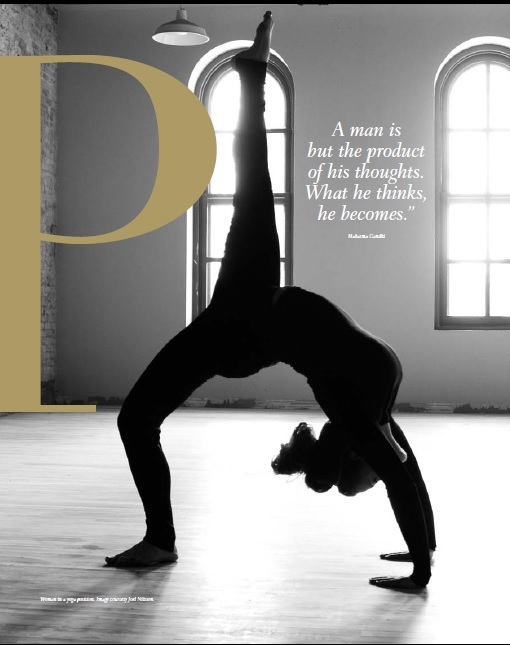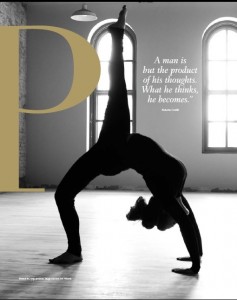
The Power of PosiTiviTy By Noora Kobty
‘Modern day life is filled with constant stress. We often forget the power of our thoughts to
channel positive energy to get us through difficult situations. Frankie Rozwadowska explores how
necessary it is to train our minds to focus on the good in order to combat the bad.
Is the glass half full or half empty’? We all answer
‘half full’, but is that because we know that’s
what we should say? The reality is, the majority
of us would say ‘half empty’, but we know that
how we answer this question is a strong reflection
on how we look at life. Negative thoughts act as
a barrier – an inhibitor that stops us from seeing
and experiencing new things while preventing
us from dealing with and adapting to everyday
situations or coping with stress. They also affect
our health, with research proving that positive
thinking creates lower levels of distress and
depression, reduced risk of illness, and longer
life expectancy. So why don’t we want to say ‘half
full’? Can we re-train our minds to become more
positive? We can if we want.
The brain is extraordinarily powerful, responsible
for everything from keeping our hearts beating
and our limbs moving to managing thoughts
and emotions. There are numerous sayings
suggesting the power of thought, for example
‘mind over matter’ or ‘you can do anything
you set your mind to.’ If our mind controls
everything, and we control our mind – then we
hold the key to our happiness. It’s all about The
Law of Attraction, the principle that ‘like attracts
like.’ If you think positively, positive things and
people will generally come your way. Likewise
negative thoughts bring about negative people
and experiences.
Yet the challenge is that positive thinking is
easier said than done. We get stuck in a rut,
picking up bad habits and allowing stress or
negative people to affect our state of mind. Noora
Kobty, a Counseling Psychologist at the German
Neuroscience Center in Dubai, advises that to
change our way of thinking we must assess our
‘self talk’, our everyday thoughts. “It’s how you
see yourself and things around you. If you realize
you’re a pessimist, then that’s where to start –
learning to change your self thoughts.” This is
something we are all guilty of, and according
to Noora, a big reason why “social media and
technology impacts our everyday lives. Social
media allows us to compare our lives to others.
It’s easy to look in the mirror or a magazine and
tell yourself you aren’t good enough, that you’ll
never be that pretty or that skinny. When we
constantly compare ourselves to others we enter
into a vicious egotistical cycle; we constantly
feel the need to achieve more, change ourselves
instead of focusing on what we have. This will
never prove self-satisfying.”
It’s in these situations that positive thinking can
radically change how we feel about ourselves
and, consequently, about our life. Instead of
focusing on the negative in a situation, focus on
the positive. Noora uses the example of someone
who discovers they didn’t get their desired job.
“The positive thinker is more likely going to
think of ways he can do better and resolve the
situation, whereas a pessimist is likely to dwell
on the situation and do nothing to help himself.”
By adapting our attitudes in this way, we
subconsciously open the door to many new and
exciting opportunities. Sabina Christensen, a
Personal Development Consultant at LifeWorks
Dubai, strongly believes that “the benefits of
positive emotions don’t stop after a few minutes of
good feelings subside. In fact, the biggest benefit
that positive emotions provide is an enhanced
ability to build skills and develop resources for
use later in life.” Therefore, negative thoughts
shut you off from the world, limiting what you
see, altering your perception of the good in any
situation and the options available to bring
about beneficial change. “For example, when
you’re stressed out about everything you have to
get done today, you may find it hard to actually
start anything because you’re paralyzed by how
long your to-do list has become. Or, if you feel
bad about not exercising or eating healthy, all
you think about is how little willpower you have,
how you’re lazy and don’t have any motivation. In
each case, your brain closes off from the outside
world and focuses on the negative emotions of
fear, anger, and stress. Negative emotions prevent
your brain from seeing the other options and
choices that surround you.”
Both Kobty and Christensen believe meditation
is one of the most effective ways to channel
positivity and clear out negative thoughts,
especially in difficult or stressful situations. It
helps us focus on learning to be in the present
moment. As Christensen says, “very often we
are going around at 100 kilometers an hour,
not even conscious of our thoughts or how
we’re doing in any one minute. Meditation and
mindfulness slows us down, making us aware
of the now – allowing us to live in the present
and not in the past or future.” If you are new to
meditation, Kobty suggests starting with a simple
process, “all it takes is for you to relax and allow
peaceful thoughts to enter your mind. Use words
or sentences that are meaningful to you, for
example ‘I am a good person’, ‘I have people that
love me.’”
Kobty also suggests making a list of the things
in your life that cause you stress according to
the level of anxiety they cause. This helps you
recognize what you find difficult and to focus
on positive ways to overcome them. Christensen
recommends writing down positive experiences
every day. A study published in the Journal of
Research in Personality showed that those who
wrote about a positive experience every day,
for three consecutive days, versus those who
wrote about a control topic, had more positive
experiences and better mood levels. So set aside
some time for yourself, surround yourself with
people who believe in you – and soon you will
too. When you’re faced with a tough or stressful
situation, use the power of your mind and positive
thoughts to get you through. Soon that glass
won’t just be half full – it will be overflowing.
Masquerade_9_ThePowerofPositivity
Noora Kobty


